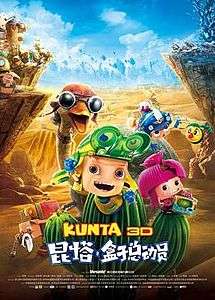Bunta Trilogy
| The Bunta Trilogy | |
|---|---|
 | |
| Directed by | Lian Li |
| Written by | Lian Li |
Production company |
Zhejiang Versatile Media DuArt Film and Video |
Running time | 82 minutes |
| Country | China |
| Language |
Chinese English |
| Budget | RMB100 million |
The Bunta Trilogy (Chinese: 《昆塔》; pinyin: Kūntǎ) is a Chinese animated film series by Zhejiang Versatile Media. The first movie opened in theaters in China on August 2, 2013. The sequels are currently still in development.
Plot
In the first Bunta movie, which takes place on a faraway planet the size of a peanut, teenage boy Boca goes on a journey to search for Bunta, a legendary cactus plant that may save his community from an impending food crisis. Though wanting to do it by himself as a hero would, he is tagged along by a younger boy Neepop, who is also his big admirer. The two make their way farther and farther away from home, befriending Wishstick Mountain's Princess Gaga, who joins their cause after an intense fight with a super villain from the Lizard Valley.[1]
Production
Miniature effects were used to produce the first Bunta movie in 3D, coupled with the proprietary technology "Kmoke 9-Axis Automated Frame-by-Frame Synchronizing Technology for Virtual and Physical Cameras" developed by Zhejiang Versatile Media. The precision level of this synchronization system goes down to micrometers.[2]
6,700 AliCloud computers were used to perform the final rendering for the 82-minute feature, the first of its kind in China.[3]
DuArt Film and Video was hired to "adapt the script, audition talent, record voices, score the whole film, create the entire sound design" [4] for the first movie.
References
- ↑ Tianzi Harrison (August 2, 2013). "Curtain up on New Chinese Animated Film". Hybrid News Group.
- ↑ 張晨 (July 23, 2013). 《昆塔》導演李煉:不可能是不可能的事 [Bunta Director Li Lian: Nothing is Impossible] (in Chinese). Sina News Taiwan. Retrieved July 29, 2013.
- ↑ "昆塔与阿里云:基于云上的逼近好莱坞的3D动画" [Bunta and AliCloud: Hollywood-level 3D animation made possible by cloud computing] (in Chinese). CSDN.net. May 31, 2013. Retrieved July 30, 2013.
- ↑ Stina Hamlin (July 17, 2013). "Some of the most daring work in filmmaking today is emerging from independent animation". The Official DuArt Blog. Retrieved July 30, 2013.